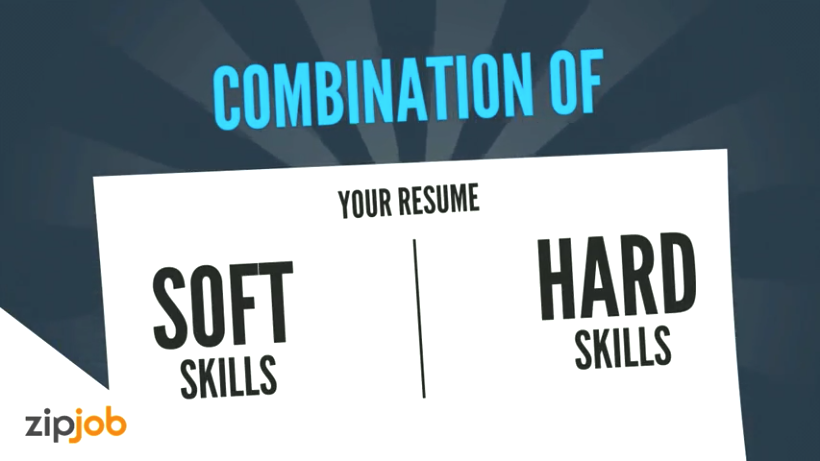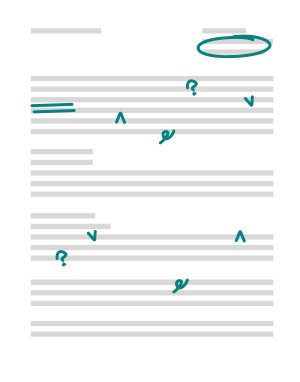
This post has been updated and merged with our more comprehensive post: 10 Best Skills to Put on Your Resume
The best skills for a resume are skills you already have.
Seriously!
You aren't going to impress any employers by padding your resume with skills you don't know anything about. Any list of skills for resumes is worthless if you don't actually have any of those skills.
Instead, the resume skills you need most are the talents and abilities that you've used to accomplish something in a work setting.
You have only have one or two pages to earn an interview. Make your resume skills compelling by including the right skills in the right way!
The Zipjob team is here to help! By the end of this article, you'll know :
The most common types of skills
How to identify what skills employers want on your resume
How to best include skills throughout your resume
Let's get started! First, we have a quick video for you about skills on resumes.
Resume skills you need to include to land that interview
https://www.youtube.com/embed/VAvyTCiN09E
The big ideas
Most people don't spend as much time on their resume skill section as they should.
You should match your resume's skills to what the job description wants.
You should use a combination of hard and soft skills.
Remember, hard skills are learned, technical and quantifiable. Soft skills are people skills, communication skills, and character traits.
Did you know?
Employers are looking for applicants who have both hard skills and soft skills. However, there are different ways you should talk about these skills on your resume.
Hard skills are specific and usually required to succeed in a job. You can describe how you've used your hard skills to achieve certain results, using metrics and numbers. You may also describe your hard skills as certifications, test scores, or with examples of your work.
Soft skills can't be easily measured and are often open to interpretation. To display your ability, you need to offer examples of how you've used your soft skills to succeed. Add these to your work experience section as bullet points or descriptive sentences.

How to use skills on your resume to land interviews
There's no secret recipe to make your resume universally irresistible to employers. There are simply too many hiring professionals looking for different kinds of people to solve different kinds of problems.
However, there are some basic things you can do to make your resume impress certain people hiring for specific positions. Here are the top tips from our team of career experts about how to leverage your skills to stand out.
Identify your key skills
Make a list of your strongest skills. Ideally, these are workplace skills; however, don't rule out personality traits, academic skills, or skills from volunteer work and side hustles.
Having trouble? Try mulling over these prompts.
What types of things do you do every day? What tools or talents help you perform those tasks?
What are you better at than most other people?
What skills have you used to make an impact in your past jobs?
What hard skills do you most enjoy using at work?
What sort of traits do people compliment you on?
You can also try taking some free career assessments for inspiration.

Research common skills in your industry
This is vital for people who are trying to switch into a new career or people who haven't looked for a new job in a few years. Consult recent job descriptions on top job search sites like Indeed and LinkedIn and use them to add to your list of skills.
Check out lists of in-demand skills. These lists are a good reference to see what is popular for the year
Remember not to add skills just because they're trendy: only include skills you actually have on your resume. These lists can help jog your memory, though, or help you determine what skills to emphasize. For example, in 2020, emotional intelligence is one of the top soft skills.
You can also reference resume examples that include education, work experience, and skills for your job title.
Expert Tip
View 200+ more professional resume samples for all industries, along with a guide to writing resumes from our career experts.
Answer the job description
Use the job description to figure out what the employer wants to see in terms of skills on resume submissions. Look for phrases such as "required skills," "technical requirement," and "must have experience with..." The words that follow are usually necessary qualifications and keywords.
Make sure all required skills appear on your resume at least once. Use the exact word or phrase as the job description. Mention your top skills multiple times, such as in a professional summary, skills section, and while describing your work experience.
Reminder: use a combination of soft skills and hard skills.

Spend time tailoring your skills for each job
Before you apply for any job online, spend a few minutes to tailor your resume. Most people don't do this. When done correctly, however, it can be incredibly effective!
There are two reasons for this:
You'll look like a great match to any hiring manager reviewing your resume.
You'll look like a great match to the ATS (applicant tracking system).
We have a great guide on How to Tailor Your Resume to Different Positions with examples and advice from our professional resume writers and career experts.
Word of caution: if you don't have a required hard skill or technical requirement, it's probably best to not waste your time applying. These are generally the skills a successful candidate will have to perform the job well. If you see a particular hard skills show up in multiple job descriptions you would like to apply to, try to learn the skill! Look for online certifications to learn the basics.
FAQs about skills on resumes
What are good skills to put on a resume?
Use a combination of hard and soft skills such as:1. Communication skills like public speaking, writing, and listening.2. Technical skills like IT skills, engineering skills, and industry-specific technology.3. Analytical skills like critical thinking, problem solving, and research.4. Transferable skills if you're changing careers like leadership and time management.5. Negotiation skills related to management, compromise, and adaptability.
How many skills should I put on a resume?
As many as you can!
You want to include all the skills the employer is looking for--as long as you can honestly claim to have each skill. Incorporate your skills throughout your resume, not just in a skills section.
Within your dedicated skills section, limit yourself to 9 to 12 key talents. Use bullet points, text bars, or columns to keep this section organized and easy to read.
For examples and formatting tips, read this next: 10 Vital Skills to Put on Your Resume
What should I call a skills section?
At Zipjob, we like to use a "core competencies" or "core proficiencies" section. Under that heading, include your most impressive technical and hard skills.
Depending on your field, you may also need a "Technical Skills" section.
We don't recommend using headings like "Skills and Abilities" or "Special Skills."
Where to put skills on resume?
Everywhere!
Zipjob's writers usually include a skills section right before the work experience section. However, that isn't the only place to put skills on a resume.
Here are more great places to put your hard and soft skills:- When describing your work experience- In your professional summary- In your resume title- When explaining your relevant coursework or academic projects
Summary
Follow the advice in this post to discover and display your skills on a resume effectively. Create a list of your soft and hard skills, expand that list by doing some research, and use those skills throughout multiple sections of your resume--not just a skills section.
You'll see best results if your resume skills match the job description, so make some quick edits to tailor your resume before applying for a job. This will make you look great to an employer and an ATS scan!
Finally, remember to stay honest about your actual skills and abilities. The best skills for your resume are always your skills.
Did we miss any of your questions about resume skills? Ask below in the comments and our team will try to assist you!
Good luck with your job search!
Related posts:


Written by
Caitlin Proctor, CPRW, Certified Professional Résumé Writer
Caitlin joined the ZipJob team in 2019 as a professional resume writer and career advisor. She specializes in strategic advice for executives, career pivots, and remote workers. Read more resume advice from Caitlin on ZipJob’s blog.
